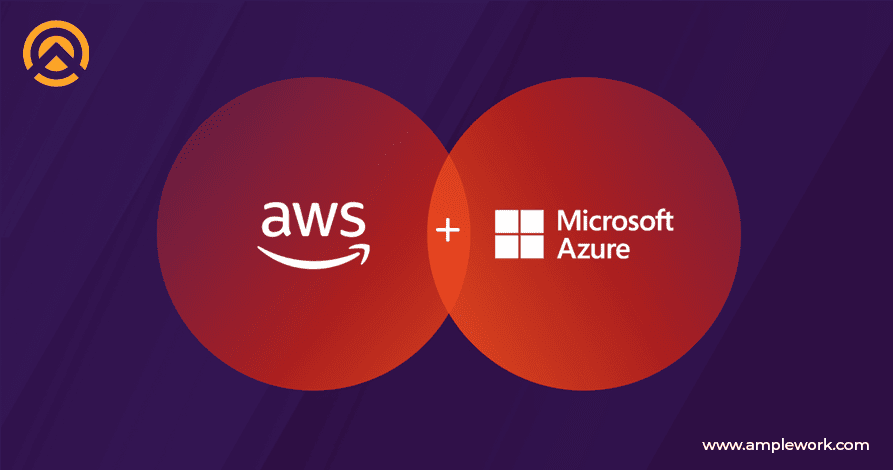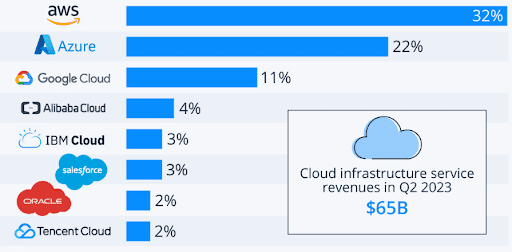AWS vs Azure: The Ultimate Guide for Startups and Enterprises
Considering technical development as an essential key for the future growth of the IT industry, the marketplace has introduced many innovative techniques in its advanced nature. The development of Cloud Computing, with services like Amazon Web Services (AWS), came into this industry for the same. Cloud Computing is defined as on-demand access to a variety of computer-related services through the internet medium. These services encompass access to applications, data storage, networking processes, development tools, and access to both physical and virtual servers. Cloud services providers (CSPs), such as AWS, manage remote data centers to deliver all these services to users. These services constitute a business-to-business (B2B) process and are available to various business organizations. They are provided in terms of Infrastructure-as-a-Service (IaaS), Software-as-a-Service (SaaS), and Platform-as-a-Service (PaaS).In this cloud industry, AWS vs Azure by Microsoft are two of the most known service providers.
Both of these service platform has a variety of features that are becoming important from the organizational we well as from the environmental aspect. The cloud computing invention is proposed with the aim of reducing the consumption of physical memory. Which somewhere works as a carbon footprint reduction asset in the current times. This sustainable approach by startups works as an effective strategy to deal with market competition.

This blog is designed for the tech-curious reader, who is looking forward to knowing which cloud service provider is the best. Weather AWS vs Azure? This matter will provide accurate and adequate information that will lead the Startup or Enterprise to make a proper decision to opt for any of the cloud computing services. Any organization or individual who is looking to get a subscription to these cloud solutions can decide with a quick read of this information.
Analyzing AWS and Azure: A Comparative Study of Cloud Services and Features

To develop something from scratch every decision related to the procedure matters the most. As such case of selecting a proper cloud computing platform for s startup or enterprise can result in overall business growth. Selecting any one cloud computing platform becomes a challenging decision as both of these techniques offer similar criteria of service.
AWS is defined as a cloud computing platform that offers a wide range of services and was invented in the year of 2006 by Amazon. AWS provides a variety of service areas like storage, cloud computing, analytics tools, machine learning capabilities, and database management. Microsoft recognizes Azure as a cloud computing platform in the market, offering various services. These services encompass cloud storage, databases, analytics tools, and virtual machines.
1. Service Features
Services offered by both AWS vs Azure are full of features that contribute to the software industry. Organizations desiring these services can select them based on their specific requirements since various features are available. The following section outlines the service features.
- Computing Services: When it comes to computing operations both of these techniques have different features. AWS offers a wide range of computing services which are Lambda, Elastic Compute Cloud (E2C), and Elastic Kubernetes Services(EKS). In the case of Azure, all the offered services rely on almost the same category. Which are Azure Virtual Machine, Azure Functions, and Azure Kubernetes Service (AKS).
- Database Service: This type of service is defined as the set-up of the cloud computing services in a way to manage, scale, operating of database even without using any hardware setup. As this only involves software installation and configuration for the performance. The database services offered by AWS are Amazon DynamoDB, Amazon Aurora, and Amazon Relational Database Services(RDS). The database services offered by Azure are Azure SQL database, Azure database for PostgreSQL, and Azure Cosmos DB.
- Storage services: With the use of these services, the user is capable of storing data on the servers which have different options for accessibility. The availability of these servers can differ from the aspect of the location, number of users, and maintenance. The types of storage services offered by Azure are Blob Storage, Files, and Disk Storage. On the other hand, AWS offers services like Simple Storage Service(S3), Elastic File System (EFS), and Elastic Block Store (EBS).
- Networking Services: Cloud networking is the kind of network terminology that works to host networking resources in the cloud. These are termed as organization’s public or private network. Both AWS vs Azure offer different networking services. In the case of AWS, these services are Elastic Load Balancing, Route 53, and Virtual Private Cloud. In the case of Azure, these services are a Virtual Network, traffic manager, and load balancer.
Also Read: Beyond Downloads: Strategies for Enhancing Mobile App User Retention
2. Market Acceptance
In the recent market trend cloud services are categorized as the most market-demanding enterprise solutions and services. Due to the involvement of different advancements the cloud market is continuously growing and will grow in the coming years. As in this market, Amazon started its journey early and it is an advantageous aspect for holding the market-leading position. Also, Azure being the newcomer in this market secured the second top position on a global scale. As per the research data of Senergy Research Group AWS has a market share of 33% on a worldwide scale as a leading cloud infrastructure service provider. Whereas Azure covers a market share of 22%. Choosing the right cloud platform is a critical component of a comprehensive Digital Transformation Strategy, enabling startups and enterprises to enhance scalability and performance. Which is slightly lower than AWS services on a global scale. These aspects show hiring an AWS developer can be a beneficial decision.

3. Pricing Models for Services
Maybe the criteria of these cloud services are similar when it comes to some of the features. But the service-providing criteria of both differ a lot. The pricing model of AWS is completely different from the pricing model of Azure. The services provided by Azure has different pricing structure. The specific resources provided come with fixed prices, and your startup can opt for a Pay-as-you-go pricing model for the services. Additionally, a free tier is available, allowing for the free use of certain services for 12 months.
While following different pricing models AWS operates in models like on-demand instances, commitment discounts, and demand instances. The on-demand model offers pay-by-hour or pay-by-second billing. Along with this AWS offers the emergence of a saving plan in the pricing model that requires one’s commitment to consistence use of service in exchange for lower princess. A startup or enterprise can look forward to consulting with the startup consulting services.
4. Easily Adaptable Developer Features
Software development is an umbrella term in which on a frequent note new technologies are introduced in the marketplace. While taking care of the developer’s requirements both these cloud computing platforms are easily acceptable. But while taking care of the majority of developers Azure is more preferred as compared to AWS. The reasons behind this choice are as mentioned further. In Azure DevOps models are supported which makes it faster and developer-friendly. Azure offers different features like extended data services offerings, advanced tools for monitoring and situation-based solutions, customization in more innovative ways, enhanced security for the whole account, assured data protection, and effective support hybrid cloud to offer high-speed routes for faster connections. In addition to this Azure features like DevOps, SDK, CLI, Visual Studio, active directory, Visual Studio code, and app services make it more adaptable as compared to AWS.
5. Security Compliance
Every organizational product’s essential requirement is to provide a secure platform due to the confidentiality of the data sets. Both AWS vs Azure have a significant emphasis on security and compliance, offering a comprehensive suite of features to address these concerns. AWS provides data encryption for both data at rest and in transit, along with the AWS Key Management Service (KMS) and Certificate Manager. AWS Identity and Access Management (IAM) enables precise control over resource access, and the platform boasts an array of compliance certifications such as ISO 27001, SOC 2, and HIPAA.
Azure, on the other hand, offers Azure Active Directory for identity and access management, as well as Azure Key Vault for data encryption. Azure’s compliance certifications also span ISO 27001, SOC 2, and HIPAA, among others. While both platforms offer features like compliance manager tools, security centers, and advanced threat protection, the decision on which platform is better for security and compliance largely hinges on industry-specific regulations, existing technology ecosystems, and the unique requirements of the organization at hand. It is essential to thoroughly evaluate each platform’s features, certifications, and integration capabilities to make a well-informed choice tailored to the specific needs of the enterprise or startup.
Also Read: Harnessing Big Data in E-commerce for Personalized Shopping Experiences
6. Easy Integration with Existing Infrastructure
Software development is the field that mainly works on different integrating platforms and the offered services are managed in a collaborative environment. The purpose of these respective integrations is to make the execution of services as smooth as possible. The completion of this process offers a connection to applications, different devices, and services. The beneficial aspect of integration is to make the business process consistent and scalable. On the other hand, this process holds the capability to make your startup fully automated, efficient, and fast. Both the technologies either it is Azure and AWS offer different integrating services which are API management, Service Bus, Logic Apps, Functions, Event Grid, and Data Factory.
All these stated integrating tools of Azure are capable of performing publishing of APIs both for internal and external developers according to the user criteria, working on connecting applications and services, creating workflows, simplifying the orchestration problems, establishing connections between Azure and third-party services, and visually integrating the data sources for data accelerations. AWS offers different integrating services such as Step Functions, Event Bridge, AppFlow, Amazon MQ, Managed Workflows for Apache Airflow (MWAA), Simple notification, workflow, and queue services.
Also Read: Implementation of Cloud computing within the healthcare industry
Final Outlines
In the contemporary realm of technological advancement, staying attuned to trends and upgrading established methodologies has become imperative. For startups, selecting the right cloud platform can be a pivotal decision. AWS and Azure stand as two major players in this domain, each with its own set of offerings and capabilities. Analyzing their strengths and weaknesses can provide startups with a strategic edge.
Amplework, with its focus on prioritizing clients, has garnered substantial experience in achieving high customer retention rates. With a collective industry experience of over 5+ years, our organization has provided a spectrum of development services, completing numerous projects and generating revenues surpassing 200M+. Within this framework, our proficiency extends to the comparative realm of AWS and Azure, equipping startups with insights crucial for informed decision-making.



 sales@amplework.com
sales@amplework.com
 (+91) 9636-962-228
(+91) 9636-962-228





